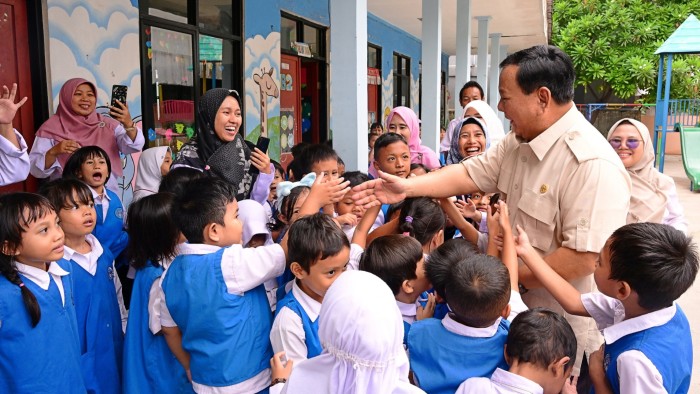Unlock the Editor’s Digest for free
Roula Khalaf, Editor of the FT, selects her favourite stories in this weekly newsletter.
Indonesia’s government agencies are rushing to cut costs — from scrapping infrastructure projects to even reducing office supplies and air conditioner use — following President Prabowo Subianto’s call to free up funds for his signature policies.
Prabowo’s belt-tightening directive is aimed at finding $18.8bn from this year’s budget to fund big-ticket initiatives, chiefly his free lunch programme, which is set to cover more than 82mn schoolchildren and pregnant mothers nationwide and cost $28bn annually.
While Indonesia’s vast bureaucracy has long been criticised as inefficient, Prabowo’s austerity order goes far beyond eliminating extravagances and leakage. The scale of the cuts, which come three months into his presidency, underscores the severe fiscal constraints faced by the former military general as he seeks to deliver on his top campaign promises.
“I continuously demand savings, efficiency. I demand the courage to cut down non-essential items,” Prabowo told his cabinet in January, as he called for official travel to be halved, a move he said will save Rp20tn ($1.2bn).
“How many tens of thousands of schools, school buildings can we repair [with the savings],” he said, adding that federal funds should also be spent on job creation, productivity improvement, and energy and food self-sufficiency.
Budget allocations for several ministries have been slashed, including a more than 70 per cent reduction for the public works ministry, leading officials to say that previously approved infrastructure projects such as toll roads and dams will be cancelled.
The economic affairs ministry’s budget was also reduced by 52 per cent, and investment ministry’s by about 40 per cent.
Reduced state support for vital industries such as infrastructure — a priority under Prabowo’s predecessor Joko Widodo — could weigh on economic activity and private investment, economists said.
That would add to Indonesia’s economic woes at a time when the country is grappling with weak consumption, a currency trading near four-year lows and an uncertain global trade environment. Prabowo is targeting 8 per cent annual GDP growth within the next five years, but the central bank has lowered growth forecasts for this year to 4.7 per cent to 5.5 per cent.
“The envisioned reallocations will cause significant disruption and controversy, given their scale,” said Kevin O’Rourke at Jakarta-based consultancy Reformasi Information Services. “While Prabowo has amassed formidable support from political elites, budget cuts that impinge on existing programs will likely prove contentious.”
The cuts go beyond travel expenses. The finance ministry has asked government agencies and ministries to reduce spending on stationery by 90 per cent and to halve outlay on for meetings, seminars, ceremonies and research.
The National Civil Service Agency has asked staff to work remotely two days a week and to ensure “efficient use of electricity and energy”. Officials have also encouraged staff to prioritise virtual meetings over physical ones.
The National Search and Rescue Agency has put off the purchase of drones and other equipment for accident and disaster response, according to state news agency Antara.
Prabowo has touted his free meals programme as a way to improve childhood nutrition and boost local economies. But economists and investors have questioned his ability to fund the programme, which was initially allocated Rp71tn under the state budget for this year but will now need another Rp100tn as the national rollout gets under way, the administration has said.
Officials have previously suggested taking on additional debt, but doing so could hurt the country’s credit rating.
“Fiscal room is constrained when it comes to discretionary spending and new programmes like the free lunch programme,” said Brian Lee, an economist with Maybank Investment Banking Group.
Prabowo’s other spending plans have also raised concerns. In October, he appointed more than 100 ministers, deputies and agency heads to his cabinet — the largest Indonesian government since the 1960s.
The government could also use savings from the austerity drive to introduce stimulus measures aimed at boosting soft domestic consumption, Lee said.
“Given the soft state of consumption in the country, the government would prefer to ramp up on stimulus to achieve growth targets.”










